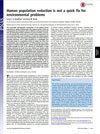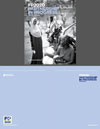-
New Research Highlights Environmental Impact of Human Numbers While FP2020 Makes Steady Strides
November 26, 2014 By Sarah Meyerhoff Global population growth is so rapid that even the most severe crises imaginable would still leave the planet with more people than it can sustainably support, according to a recent study by the University of Adelaide’s Corey Bradshaw and Barry Brook published in the Proceedings of the National Academy of Sciences.
Global population growth is so rapid that even the most severe crises imaginable would still leave the planet with more people than it can sustainably support, according to a recent study by the University of Adelaide’s Corey Bradshaw and Barry Brook published in the Proceedings of the National Academy of Sciences.Working with data from the U.S. Census Bureau and the World Health Organization, Brook and Bradshaw manipulated key demographic variables to simulate and compare the effects of hypothetical policy choices and crises on global population growth through the end of the century. They found that even after a global pandemic, climate change-driven food shortages, or a World War III-scale conflict, world population is still likely to grow to between 9.9 and 10.4 billion by 2100, within the range of the UN’s 10 to 12 billion projected range and very similar to the researchers’ business-as-usual scenarios. However, the scenarios assuming the prevention of all unintended pregnancies (an estimated 16 percent of annual births) results in a global population that is several billion people smaller. “Our model comparisons reveal that effective family planning and reproduction education worldwide have great potential to reduce the size of the human population and alleviate pressure on resource availability over the long term,” write the authors. Still, they conclude, with over 50 percent of biodiversity hotspots already under severe pressure from human activity, altering consumption patterns will be the most important step in mitigating the environmental impact of human growth in the short term.
 More than 8.4 million women started using modern contraceptives during the first two years of the Family Planning 2020 Initiative (FP 2020), according to a progress report released last week. FP 2020, which was launched at the 2012 London Summit on Family Planning, aims to extend access to modern contraceptive methods to 120 million women across 69 developing countries with an unmet need for family planning by 2020. In 2013, the use of modern contraception by 274 million women and girls prevented 77 million unintended pregnancies, and in doing so, averted 24 million unsafe abortions averted (compared to 23 million in 2012) and 125,000 maternal deaths (compared to 120,000 in 2012), according to the report. Still, due to cultural and socio-economic barriers, women’s access to contraception remains uneven within and across countries, and in many countries, an enormous effort is needed even to maintain current expenditures for contraceptives and reproductive health services.
More than 8.4 million women started using modern contraceptives during the first two years of the Family Planning 2020 Initiative (FP 2020), according to a progress report released last week. FP 2020, which was launched at the 2012 London Summit on Family Planning, aims to extend access to modern contraceptive methods to 120 million women across 69 developing countries with an unmet need for family planning by 2020. In 2013, the use of modern contraception by 274 million women and girls prevented 77 million unintended pregnancies, and in doing so, averted 24 million unsafe abortions averted (compared to 23 million in 2012) and 125,000 maternal deaths (compared to 120,000 in 2012), according to the report. Still, due to cultural and socio-economic barriers, women’s access to contraception remains uneven within and across countries, and in many countries, an enormous effort is needed even to maintain current expenditures for contraceptives and reproductive health services.Sources: Family Planning 2020 Initiative, The National Academy of Sciences.
 A Publication of the Stimson Center.
A Publication of the Stimson Center.





